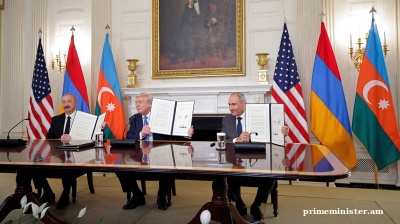President Ilham Aliyev has warned that if Armenia does not accept Azerbaijan’s international borders, Baku will refuse to accept Armenia’s.
In a very rare interview with five local Azerbaijani TV stations on January 12, Aliyev said: "If they do not want to recognise our territorial integrity, then we will not recognize their territorial integrity either. We have perhaps a hundred times more grounds to deny the territorial integrity of Armenia than they have to deny our territorial integrity.”
“Nevertheless, we are ready [to recognise Armenia’s territorial integrity] for the sake of future peace and the establishment of relations between the countries,” he added. “But I cannot guarantee that it will be the same in six months. [If] they do not want to, well, then we will see what happens."
Azerbaijan wants full access to its Nakhchivan enclave in Armenia via the Zangezur ‘corridor’ – something it argues was agreed in the 2020 ceasefire – as well as a formal peace treaty that recognises Armenia’s enclave of Nagorno-Karabakh as part of Azerbaijan.
Armenia has controlled Nagorno-Karabakh and surrounding territories since a 1992-4 war between the two post-Soviet states, though Baku won back most of those buffer territories in the 2020 conflict. Armenia denies there is equivalence between the official Lachin corridor and the transport links between Nakhchivan and Azerbaijan, and the issue has become an obstacle towards a full peace agreement.
Aliyev accused Armenia of recently breaching the ceasefire on the border and warned Yerevan that he would not hesitate to strike deep into Armenia, which he said would be unable to resist.
"Today, the Armenian army is in a completely dilapidated state and is unable to resist us more than it did during the Second Karabakh War,” he claimed. “If we see even the slightest threat to our security, we will immediately and simply destroy it, no matter where it is, no matter how deep it is in the territory of Armenia. First of all, the Armenian leadership must know and understand this."
The Azerbaijani president said that Baku was already rebuilding its stocks of weapons and ammunition that were depleted in the 2020 war and that it had had many offers to buy new military technology. “Military technology is evolving and we always want to get the best technology,” he said.
Azerbaijan’s use of Turkish drones is reported to have given it a decisive advantage in the last conflict.
Aliyev also reiterated that he considers the OSCE Minsk Group as obsolete and that the co-chairs (France, Russia and the US) of this process to find a peaceful solution to the conflict should retire. "In principle, 30 years of work experience, they are on the verge of retirement,” he said. “Therefore, I wish them long life and good health."
He criticised co-chair France for what he called its support of Armenia in the 2020 conflict, and said that the US had been absent. He also alleged that Russian peacekeepers on the border had been hampering Armenians from leaving Nagorno-Karabakh since the conflict.
The president ruled out widescale resettlement of Karabakh before the demining process was completed, saying that some 200 Azerbaijanis had so far been killed or seriously injured by mines since Baku retook some of the territories in 2020 that it had lost in the 1991 war.
Turning to the economy, Aliyev said that about 45 bcm of gas should be produced this year and 19 bcm will be exported via the Southern Gas Corridor, with more than 8 bcm exported to Turkey and more than 7 bcm to Italy. The export figure for this year is higher than previous forecasts. In the first 11 months of last year it was reported that 7m bcm were exported.
Among other comments, Aliyev also admitted that Baku had spent $10bn – close to previous estimates – to support an artificial peg between the Azerbaijani manat and the dollar in 2014-2015, but was forced to depreciate its currency because it was too costly to maintain an artificially high exchange rate.
The interview is thought to be Aliyev's first major appearance before local media since he succeeded his father in 2003. Some commentators speculated that the rare move was a response to criticism that his regime's recent media law would impose even more restrictions on free speech in the country
News

Albania aims to revive domestic defence industry as it hosts top Nato officials
Albania ended domestic arms production after the collapse of its communist regime but is now working to restart the industry.

Russian team comes dead last in Hungary’s annual grave digging contest
In a surprise move, Hungary invited a Russian team to its annual grave digging competition. In an even bigger surprise the team from Novosibirsk came dead last.

Flydubai expands Kenya operations with new Nairobi flights and increased Mombasa services
Flydubai launches new Nairobi flights from October 15 and increases Mombasa to daily service, bringing total weekly Kenya flights to 11 as part of African expansion.

Small, medium-sized countries establish Future of Investment and Trade Partnership
UAE joins 13 countries in establishing Future of Investment and Trade Partnership to promote open trade, strengthen supply chains and address emerging economic challenges globally.




